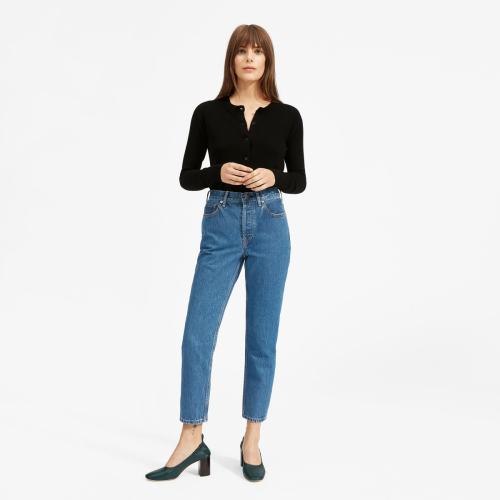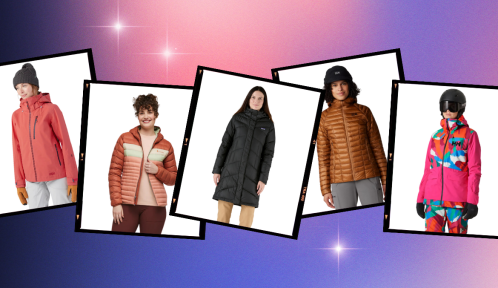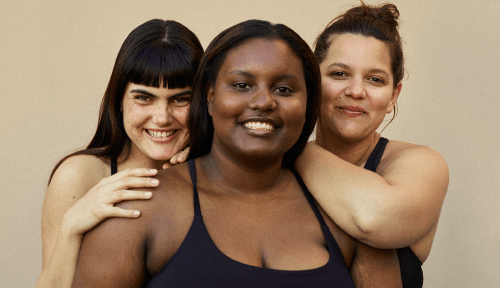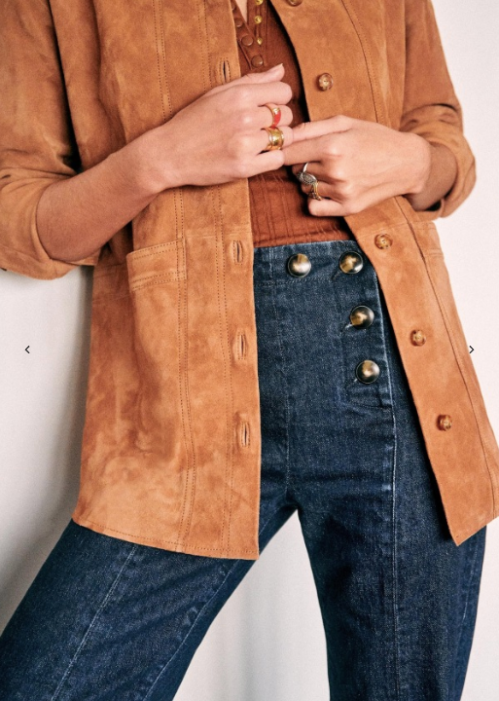Our editors independently select these products. Making a purchase through our links may earn Well+Good a commission
Socially conscious, eco-friendly, cruelty-free, sustainable. All buzz words you’ve heard to describe ethical fashion. The category—which was once synonymous with scratchy fabrics and blah-as-heck hues—has far surpassed “trend” status. More and more, clothing and accessory brands are innovating with their social and environmental impact in mind and turning out some of the best new fashions out there from swimwear to outerwear, plus one of the most-loved categories: sustainable jeans.
So, um, what makes sustainable jeans sustainable?
There are a lot of things that can make a garment unsustainable from tons of waste to the use of toxic chemicals and unethical labor practices. The biggest culprit when it comes to denim, though, is water.
“Apparel production and in particular denim depends heavily on water availability. Not just in the washing of a jean at the point of garment production, however, [but also] at the very beginning point in the cotton agriculture stage,” says Jac Cameron, co-founder and creative director of the clothing brand AYR. “The water consumption for denim production is usually 1,000 gallons per one wash load, which is roughly about 60 [pairs of] jeans.”
Cotton farming can negatively impact the environment, too. “The use of hazardous chemicals used in the cotton farming, dyeing, and finishing stages, and highly repetitive and manual finishing techniques, make the traditional process of making jeans dangerous for not only the environment but also the workers handling the denim,” says James Bartle, founder of Outland Denim, a premium-denim label that was founded with the mission to employ and provide opportunities for young women at risk of sex exploitation and trafficking.
But it’s not all bad. Brands making sustainable denim are using organic and raw cotton (both of which require significantly less water in the production process), as well as recycled cotton and alternative fibers such as TENCEL™ Lyocell fibers with REFIBRA™ technology, including the vintage-inspired line, Boyish. “We focus on designing products with either zero or very minimal amounts of polyester (plastic based) fibers,” says founder Jordan Nodarse. “This gives us the chance to recycle our denim after [it’s] been worn more effectively. Currently, 60 percent of our collection is made with 100 percent natural fabric.”
The use of ethically sourced, raw, and recycled materials is just one step brands like AYR, Boyish, and Outland Denim are taking to make the denim industry more sustainable. They’re also able to lower their environmental impact through new technology to further decrease water usage, energy, and repetitive manual labor.
“All of our denim is made in Los Angeles, where the focus is very notably on water conservation with water usage being regulated across the state,” says Cameron, who explains how AYR often uses darker denim when possible because it requires less usage in the washing process. The AYR co-founder also notes how the brand’s Aloe Jean is made with recycled cotton and treated with ozone gas instead of water to create different denim washes and fade detailing—a practice that Boyish also employs through the use of Tonello machinery to give jeans a vintage look.
“[Tonello’s] Up system uses water vapor mixed with biodegradable, environmentally safe enzymes to create nanobubbles to wash jeans without using pumice stones and harsh chemicals while only using 20 percent of the traditional amount of water,” says Nodarse. “They also have an ozone eco-free system installed to use O3 ozone gas to take down the color in denim in an environmentally safe way without using hypo-chloride.”
Sustainability expert and the author of Give a Sh*t: Do Good. Live Better. Save the Planet Ashlee Piper has eased into sustainable denim by shopping it secondhand. “I own a few ‘eco’ pairs and I have to say, I see and feel little-to-no difference between [them] and traditional fast-fashion brands, which I think is a good thing. Same performance, just better eco-ethical cred, which is what we’re all kind of looking for.”
But Piper cares about more than a flattering and comfortable fit. She’s also concerned with the ethical practices that go into making her jeans. “To me, sustainability also means ethical, so there are environmental, as well as labor concerns with denim.” The questions she asks herself: Who’s making the actual fabric? How far does the denim have to travel? Who’s making the jeans and are they being paid a living wage in safe, consensual, and empowering working conditions? What kind of fuels are required to produce and distribute the jeans? Are the patterns low- or zero-waste, or are they traditional patterns that leave a lot of material waste? How far do the jeans have to travel to get on my body? “Those are just a few concerns,” she says.
When I ask Bartle about this, he says, “The denim industry is also, of course, not immune to the injustice that is insufficient wages, unsafe production facilities, and unreasonable working conditions that workers throughout the whole fashion industry experience.” It’s one reason why many sustainable fashion brands take the extra steps of offering answers to FAQs like Piper’s on their websites in an effort to be more transparent. Pro tip: If you come across a brand that touts itself as being sustainable but isn’t able to address the above, consider emailing them before adding to cart so that you’re casting your vote (this time with dollars) for a brand that shares your values.
That last point is particularly important because, when it comes to price, sustainable jeans aren’t exactly cheap—you’re paying for the highest quality of materials used and the necessary infrastructure it takes to produce ethically…and, of course, the peace of mind.
“The more pressure consumers place on brands to commit to eco-conscious practices, the more affordable and accessible alternative manufacturing will become,” says AYR co-founder and chief operating officer, Maggie Winter. “Today, mass retailers have not prioritized the environment over the economy. As a result, sustainable materials and manufacturing are expensive.” But that can (will) change if demand for sustainable fashion increases.
Whether you’re looking to replace your go-to pair of skinny jeans or want to overhaul your entire denim wardrobe in favor of ethically made styles, ahead, 13 pairs of sustainably made jeans to shop now from classic fits to trend-driven silhouettes.
13 brands that make the best, most stylish sustainable jeans
1. Citizens of Humanity, $178 to $975
Our Pick:Citizens Of Humanity Annina High Rise Wide Leg, $238
They’ve been around since 2002, but in recent years, Citizens of Humanity has transitioned to a more sustainably focused business model from automated denim cutting machines to maximize efficiency and minimize fabric waste to implementing new laser technology, which cuts down on water usage. Every pair of jeans is made at their own sewing and laundry facilities in LA.
2. Warp+Weft, $49 to $97
Our pick: Warp+Weft JFK Plus Skinny, $98
This sustainable, size-inclusive brand is a go-to for classic silhouettes from skinnies to straight legs.
3. Everlane, $68 to $78
Our pick: Everlane The ’90s Cheeky Straight Jean, $78
Everlane is synonymous with ethical quality and this nostalgia-inspired pair is made from premium non-stretch Japanese denim for a “butt-boosting” fit.

4. Aritzia, $30 to $249
Our Pick: Aritzia Denim Forum The Farrah Wide Leg, $110
For ‘70s-inspired denim with a “Best Asset” fit (which is a proprietary construction technique designed to create lift on the backside with stretch pockets that smooth and slim in the front), Aritzia’s new in-house denim brand, Denim Forum, features sustainable jeans made from organic cotton and Green Screen-certified fabric softeners.
5. Outland Denim, $195 to $265
Our pick: Outland Denim Abigail Crop, $195
Offering a range of skinny and girlfriend jeans in various lengths and colors, Outland Denim is headquartered in Australia with a training and production facility in Cambodia. There, the company invests in the personal development and well-being of its employees who carry out the innovative, ethical, and environmentally responsible production practices (which earned the brand an A+ score in an external audit by the World Aid Ethical Fashion Report).
6. Re/Done, $75 to $452
Our pick: Re/Done High Rise Stove Pipe, $250
With a cult following, Re/Done recycles old Levi’s jeans by disassembling old styles and redesigning new silhouettes via a water-conserving technique that’s void of toxic chemicals. Each pair is made in downtown LA.
7. AYR, $195 to $245
Our pick: AYR The Aloe Jean, $295
Made from ISKO fabric woven from recycled materials, AYR’s Aloe jean is finished with technology that replaces the use of chemicals and washed using less than one cup of water.
8. Boyish, $69 to $188
Our pick: Boyish The Casey, $168
With an asymmetrical fly, this high-waisted rigid straight jean includes recycled cotton, which reduces the brand’s carbon footprint and water usage. Known for a vintage-inspired look, Boyish discovered that the environmentally-conscious enzymes and chemicals used in the production process react more aggressively with their 100 percent natural and cellulosic denim—a win, win!
9. DL1961, $106 to $396
Our pick: DL1961 Hepburn High Rise Wide Leg, $199
With environmental awareness and sustainability at the crux of the brand, DL1961 crafts its jeans in a solar-powered, in-house facility with indigo dyes derived from plants and uses software to track dye usage and water consumption, recycling 98 percent of the water used on site.
10. E.L.V. Denim, $387 to $413 (approximate estimates)
Our pick:E.L.V. Denim 28″ Dark/Light Jean, approximately $387
Based in East London, E.L.V. Denim repurposes old denim by crafting new pairs of jeans out of two halves of vintage sustainable jeans. Each pair of jeans is an entirely one-of-a-kind from color to fit, giving a second life to fabric by diverting it from landfills.
11. Ética, $195 to $205
Our pick:Ética Tyler Ankle, $145
Offering premium, vintage-inspired jeans with refined fits, LA-based Ética is one of the only manufacturers fully certified for Global Impact, Clean Industry Practices, and Social Responsibility.
12. Kowtow, $119 to $169
Our pick: Kowtow Standard Pant, $259
Founded in 2007 by Gosia Piatek, Kowtow uses renewable and sustainable fibers and ethical manufacturing to deliver minimal, utilitarian-inspired collections that include a range of denim from sustainable jeans to dress pants and jackets.
13. Sézane, $104 to $126(approximate estimates)
Our pick: The Parisien, approximately $127
Sézane’s hot-off-the-presses denim line has earned the Global Organic Textile Standard (GOTS) as well as Oeko-Tex, which means its fabrics are grown according to guidelines restricting the use of petroleum-based fertilizers, pesticides, and synthetic products. Oh, and also, they’re hella cute.
This post was originally published on March 6, 2019; updated on January 22, 2020.
Um, you should never, ever wash your jeans. And this particular pair feels just like leggings.
Sign up for the Well+Good SHOP Newsletter
Get exclusive deals on wellness, beauty, fitness, and food products that have been hand-picked by our editors.
Got it, you've been added to our email list.













